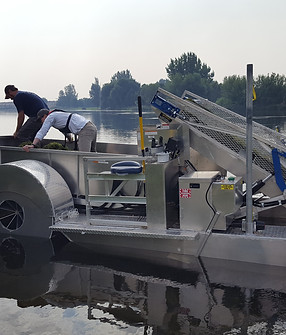
Saving Our River - Restoring the Lower Yakima River
Keeping the Yakima River Safe for Salmon & Our Communities
Benton Conservation District (BCD) with our partners commissioned a video to highlight the challenges facing our lower Yakima River. Many special thanks to Yakima Basin Fish and Wildlife Recovery Board, Benton County Mosquito Control Board, US Bureau of Reclamation, Yakama Nation Fisheries, Columbia Irrigation District, and other community leaders for their support in telling our story to help save our river.
Water Stargrass Videos
Mitigation Effort Led by BCD
BCD's Efforts
Abundant aquatic vegetation threatens beneficial use of the Yakima River including water delivery, water quality, fisheries habitat, and recreations.
The aquatic plants are native, but acting as an invasive species. They are converting a once fast-flowing riverine habitat into a slower-moving marsh. The plant impacts dissolved oxygen, temperature, and river velocity -clogging irrigation canals, impeding water delivery and hindering salmon migration.
A custom built harvester was purchased with a Washington State Commerce grant and its pilot operation funded by the Yakima Basin Integrated Plan:
-
Approximately 504,000 lbs of plant material were removed from the lower Yakima River in 2023
-
Staff harvested for 26 days, logging over 145 equipment hours with 15.3 acres harvested at Horn Rapids Park above Wannawish Dam
-
Harvesting resulted in noticeable improvements in river flows and water quality
BCD's Plan and How You Can Help
Going forward, we plan to increase operations with additional staff and machines, explore watershed level controls and local treatment techniques for long term vegetation control, and evaluate environmentally friendly disposal methods for harvested material. This is a time our community needs to come together to save our river for all it's functions and uses: habitat, irrigation, recreation, and more.
Interested in helping us save our river? Volunteers are needed to help us remove plant material from the lower Yakima River in the hard to reach areas our harvester cannot reach. Click below to fill our a form to get on our volunteer list!
Contact Your Legislators
Write to your legislators so they understand the challenges we are facing in the lower Yakima River and how they negatively impact our community. Follow the steps below to send your representative a message.
1. Select your representative below. If you are unsure which representative to write, click HERE to find your representatives.
2. Fill out the form and copy the message below into the message box.
3. Personalize your message. There are two sections in the message inside brackets for you to remove and input your information. The first asks for a short statement of your personal experience with water stargrass and the second is a placeholder for signing the document.
4. Submit your message! We thank you for supporting our community in restoring our river.
Find Your Representative
House
Stephanie Barnard; 8th District: https://stephaniebarnard.houserepublicans.wa.gov/contact/; stephanie.barnard@leg.wa.gov
April Connors 8th Legislative District:https://aprilconnors.houserepublicans.wa.gov/contact/; april.connors@leg.wa.gov
Bruce Chandler 15th leg district: https://brucechandler.houserepublicans.wa.gov/contact/; bruce.chandler@leg.wa.gov
Bryan Sandlin; 15th leg district: https://bryansandlin.houserepublicans.wa.gov/contact/; bryan.sandlin@leg.wa.gov
Mark Klicker; 16th leg district: https://markklicker.houserepublicans.wa.gov/contact/; mark.klicker@leg.wa.gov
Skyler Rude;16th district: https://skylerrude.houserepublicans.wa.gov/contact/; skyler.rude@leg.wa.gov
Senate
Matt Boehnke (8): https://mattboehnke.src.wastateleg.org/contact-me/;
Nikki Torres (15): https://nikkitorres.src.wastateleg.org/contact-me/
Perry Dozier (16): https://perrydozier.src.wastateleg.org/contact-me/
Copy Message Below:
I am writing to ask your support of state programs and funding to help solve the challenge of harmful aquatic plant growth within the lower Yakima River that is impacting our way of life. Although native, the aquatic plant known as water stargrass, acts like a noxious weed and has taken over the lower Yakima River. During the summer months it physically displaces the river by three feet - slowing flows and converting our free-flowing river into a marshy swamp.
The explosive plant growth impairs many of the beneficial uses of the lower Yakima River which feeds the lifeblood and economy of our county. Over the last 20 years, water stargrass has resulted in a total disappearance of lower river fall Chinook spawning habitat from Prosser to Richland resulting in loss of local native salmon fishery stocks. The dense water stargrass mats impede water flow decreasing irrigation delivery efficiency while also clogging irrigation screens, delivery canals, and water intakes. Slowed summertime water flows result in warmer water temperatures, creating ideal conditions for harmful bacteria growth and algal blooms. Newly established swamp habitat is a breeding ground for disease carrying mosquitos, increasing the risk for West Nile virus in Benton County. The abundant growth of this aquatic plant has degraded recreational enjoyment of the Yakima River for those who love to fish, paddle, float, and swim in the Yakima River waters.
{If interested, please add a short statement on your personal experience with water stargrass.}
I am asking for your support of programs and funding at the state level to help residents and local agencies, such as the Benton Conservation District, build sustainable water stargrass solutions and protect our river before it is too late. We need resources to build local programs that provide capacity to combat the problem in both the near-term and long-term. As a citizen of Benton County and this great community, I appreciate your consideration and support of this important issue.
Signed,
{insert name}










